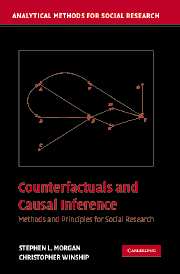Book contents
- Frontmatter
- Contents
- Acknowledgments
- Part 1 Counterfactual Causality and Empirical Research in the Social Sciences
- Part 2 Estimating Causal Effects by Conditioning
- Part 3 Estimating Causal Effects When Simple Conditioning Is Ineffective
- Part 4 Conclusions
- 10 Counterfactual Causality and Future Empirical Research in the Social Sciences
- References
- Index
10 - Counterfactual Causality and Future Empirical Research in the Social Sciences
Published online by Cambridge University Press: 05 June 2012
- Frontmatter
- Contents
- Acknowledgments
- Part 1 Counterfactual Causality and Empirical Research in the Social Sciences
- Part 2 Estimating Causal Effects by Conditioning
- Part 3 Estimating Causal Effects When Simple Conditioning Is Ineffective
- Part 4 Conclusions
- 10 Counterfactual Causality and Future Empirical Research in the Social Sciences
- References
- Index
Summary
What role should counterfactual models play in causal analysis in observational social science? Some claim that it is the only correct way to think about causality while others claim that it is of limited value. We take an intermediate position. We see the methods of counterfactual causal modeling as constituting a useful set of tools that can help to improve the investigation of causal relationships within the social sciences. We believe that counterfactual methods both complement and extend existing approaches to causal analysis.
The strength of counterfactual modeling is that it demands that the researcher specify precisely how changing the treatment state, holding other relevant conditions constant, would change the expected outcome for a relevant unit of analysis. Counterfactual models also reveal the essential requirement of explanations that appeal to mechanisms: One must document how a treatment effect is propagated by a mechanism to an outcome, considering each distinctive causal pathway along the way.
Nonetheless, counterfactual models require much less than some versions of structural equation modeling. Counterfactual models do not require a full specification of all causes that produce an outcome, and they do not assume (or require) that a causal effect estimate be population invariant. In many cases, their parameters can be estimated under far weaker assumptions. For many average causal effects of interest, for example, the data merely need to be balanced with respect to the determinants of treatment assignment.
- Type
- Chapter
- Information
- Counterfactuals and Causal InferenceMethods and Principles for Social Research, pp. 277 - 290Publisher: Cambridge University PressPrint publication year: 2007

